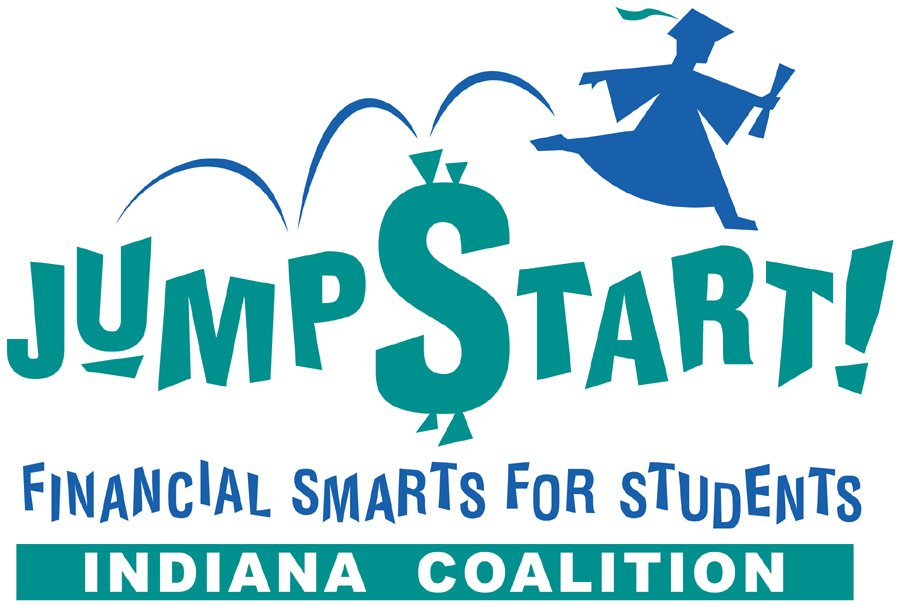
Indiana Jump$tart Coalition for Personal Financial Literacy
An Independent Affiliate of the Jump$tart Coalition
Indiana Jump$tart is an independent affiliate of the national Jump$tart Coalition for Personal Financial Literacy. The national Jump$tart Coalition is a 501(c)(3) tax-exempt non-profit organization headquartered in Washington, D.C. Founded in 1995, the coalition includes more than 100 national partners and a network of 51 state affiliates that share a commitment to #afinlitfuture and to working collaboratively toward common goals.
About Us
The Indiana Jump$tart Coalition is a non-profit organization with individuals and organizations representing business, government and education who have joined together to improve the personal financial literacy of Indiana’s youth. We exist to improve the personal financial literacy of all Hoosiers by promoting and teaching personal financial skills, particularly to Indiana’s youth, so they can make informed, responsible financial decisions for a lifetime.
Officers
President:
Amy Bayliff, Zeiders Enterprises
Secretary/Treasurer:
Amina Malcom, Primerica Financial Services
Marketing/Web Administrator:
Justin Haney, Centerfield Capital Partners

Board of Directors
College Choice 529 Plan, Jodi Golden
Federal Reserve Bank of St. Louis – Louisville Branch, Erin A. Yetter, Ph.D.
Human Services, Vickie Bateman
Indiana Council for Economic Education, Harlan Day and Jeff Sanson
Indiana CPA Society, Jenifer Groth, APR
Indiana Department of Education, Eric Ogle and Peggy Wild
Indiana Housing & Community Development Authority, Amber Sheffer
Indiana Secretary of State’s Office
Indiana Youth Institute and Trip to College, Lori Kretz
Internal Revenue Service, Kate McKnight and Ken Williams
Julianne M. Charlesworth, CPA (individual partner)
Junior Achievement Indianapolis
Junior Achievement Worldwide, Sharon Lents
Old National Bank, Joni Clarke
NetLiteracy, Don Kent
Networks Financial Institute, Martha McCormick
Purdue Extension, Edie Sutton
United Way of Central Indiana, Robb Schrimshaw
Upromise Investments, Inc., Temeka Easter
Partners
Chase Bank
College Choice 529 Plan
Federal Reserve Bank of Chicago
Federal Reserve Bank of St. Louis
Human Services
Indiana Council for Economic Education
Indiana CPA Society
Indiana Credit Union Foundation
Indiana Department of Education
Indiana Department of Financial Institutions
Indiana Family & Consumer Science Education Association
Indiana Family, Career & Community Leaders of America
Indiana Financial Services Foundation for Education
Indiana Housing & Community Development Authority
Indiana Secretary of State’s Office
Indiana Youth Institute
Junior Achievement of Central Indiana
Junior Achievement of Greater Lafayette
National City Bank
NetLiteracy
Networks Financial Institute
Old National Bank
Purdue University Extension
State Farm Insurance
Trip to College
United Way of Central Indiana
Upromise Investments Inc.

Get Involved
There are many ways that organizations or individuals can become involved with the coalition.
Join the Coalition! If your organization or you as an individual are actively engaged in promoting personal financial literacy amongst youth, we invite you to become a member.
Support the Coalition! The Jump$tart Coalition is a charitable 501(c)3, not-for-profit organization. As such, in-kind donations such as the printing of promotional materials or hosting of meetings and events are greatly appreciated. The Coalition also welcomes monetary contributions.
Make a difference locally! Organizations and individuals can make a great impact at the local level. Here are just a few ways that you can make a difference:
- Financial Institutions: Volunteer to work with a local school or district to provide classroom presentations or teacher support.
- Educators: Incorporate personal finance within your curriculum. Personal finance has been taught successfully to students of all ages and within many core and elective subjects. For more resources, go to the Jump$tart Clearinghouse and search according to your grade and subject matter.
- Policy Makers: Consider ways to incorporate personal finance education into your school’s curriculum and teacher professional development programs.
- Parents: Begin teaching your child about personal finance at a young age and continue to reinforce these skills. See the resources section or visit the Clearinghouse for more ideas on teaching your child about personal finance matters.
Financial Literacy Resources
Below is a list of Web sites with financial literacy resources for educators, parents, adults, teens, children and others. In addition the list below, the National Jump$tart Coalition has a comprehensive clearinghouse with financial literacy resources.
360 Degrees of Financial Literacy
360 Degrees of Financial literacy is a national volunteer effort of the nation’s Certified Public Accountants to help Americans understand their personal finances and develop money management skills. It focuses on financial education as a lifelong endeavor—from children learning about the value of money to adults reaching a secure retirement.
Building Your Future (Actuarial Foundation)
At a time of widespread economic turmoil and financial challenge, it is more important than ever that teens are given the knowledge and skills they need to manage their money wisely and to make smart decisions for the future. In response, The Actuarial Foundation has released Building Your Future, an engaging and relevant financial literacy curriculum to help teens master the foundational elements of personal finance and to prepare for life after high school.
Feed the Pig
“Spokespig” Benjamin Bankes is here to remind you to feed your piggy bank. This website is here to help you do just that. Here, you’ll find fun tools, a quiz, tons of tips and other resources. They will all help you think through your spending and saving habits, identify ways you can start saving and commit to making changes that will reduce your debt and grow your savings.
Gen i Revolution
Developed for middle school and high school students, this online game gives your students the chance to learn important personal finance skills as they play and compete against fellow classmates. The game includes fifteen Missions in which students attempt to help people in financial trouble. Students join the Gen I Revolution, strategically select their Operatives, and begin to explore and earn points as they work to complete each Mission.
Indiana Council for Economic Education
The Indiana Council for Economic Education (ICEE) is a non-profit, educational organization located at Purdue University. Founded in 1954, the ICEE is a comprehensive partnership of leaders from business, labor, agriculture, education, and government dedicated to increasing economic literacy in Indiana. Its mission is to prepare students to become active citizens and productive member of our economy by providing them with the ability to make sound economic decisions. ICEE provides classroom resources, curriculum and professional development workshops in addition to running the Stock Market Game.
Indiana Department of Education – Financial Literacy Education
In 2009, Indiana passed a law requiring personal finance be taught in grades 6-12. This Web site has information about the financial literacy standards and resources available to help teachers fulfill the requirements of that legislation.
Junior Achievement Student Center
The JA Student Center helps students find information about exploring careers, finding a college, paying for college, managing their money and planning a business.
Money Management
Money Management is a weekly, personal finance column offering advice on taxes, college savings, retirement planning, insurance, small business strategies and a variety of other financial issues. The columns are produced by INCPAS in cooperation with the AICPA.
NEFE High School Financial Planning Program
When it comes to learning about how to handle and manage money, any knowledge a student gains from a course on the subject isn’t worth much if there isn’t a way to turn what they learn into real actions that result in positive habits. That is what the NEFE High School Financial Planning Program® (HSFPP) does through its seven unit Student Guide and Instructor’s Manual. While most financial education programs focus on subjects to be learned, the NEFE HSFPP turns the focus on the students, so the curriculum is not about creating a budget, but creating THEIR budgets, THEIR financial plan, THEIR saving plan, THEIR investing plan. That’s right, the NEFE HSFPP personalizes learning so that students can immediately begin to apply learned skills in their own life.
Practical Money Skills
This site contains resources for educators, parents and students related to financial literacy and money management. Here you’ll find curriculum, tips and tools, online games, articles and more.
Team Fin Lit
The purpose of this site is to bring together educators, nonprofits, businesses, government agencies, community groups and others to share ideas, best practices and resources for successfully teaching financial literacy to Hoosiers. The site is members only. If you have questions or have trouble logging in, please contact Melanie Woods at Turn on JavaScript!.
Understanding Taxes (IRS)
Developed by the IRS, this curriculum correlates with state standards and is aimed at helping your students understand taxes. The online site has lesson plans and activities for teachers to download as well as a student section to apply what they learn.
Financial Education Solutions – $ucce$$ Program
Developed by Indiana student James Langford, the $ucce$$ Program is a comprehensive financial literacy curriculum designed for middle and high school students. $ucce$$ is video based, and directly correlates to state and national standards. Each lesson begins with a video (about 5 minutes in length) that teaches the main concept in an entertaining and engaging way.
